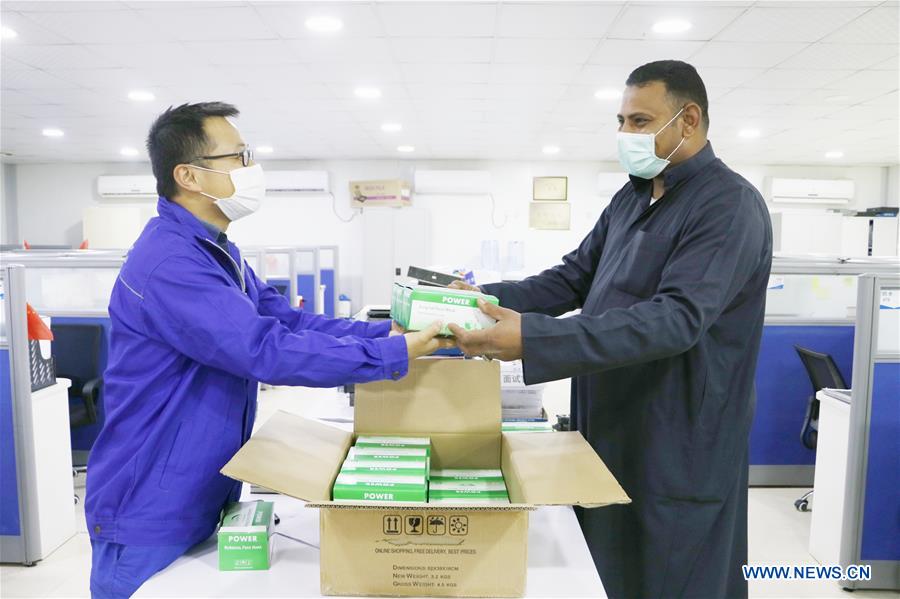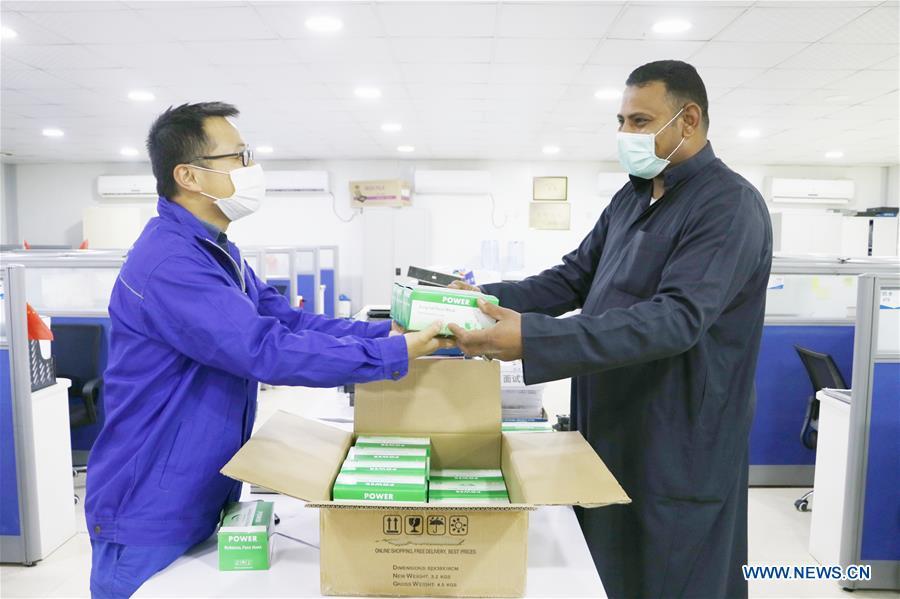
An employee (R) of China Gezhouba Group Corporation (CGGC) receives face masks at the company's project site in Jahra Governorate, Kuwait, March 2, 2020. (Photo by Liu Lianghaoyue/Xinhua)
KUWAIT CITY, June 8 (Xinhua) -- Every day at five o'clock in the morning, Wei Jianfu stands at the entrance of the project site of China Gezhouba Group Corporation (CGGC) in Kuwaiti desert, waiting for the arrival of dozens of buses carrying thousands of foreign employees.
Wei, along with other safety team members of CGGC, will get on the bus with medical equipment to measure the temperature of the employees before the bus enters the site as measures to prevent the spread of COVID-19.
"Please wear masks and keep a safe distance of 1.5 meters," he repeats these words everyday on every bus.
Currently, there are seven camps on the project site which is located on a total area of 30 square km in the desert of Kuwait.
Wei, who is the director of Safety Management Department of the project, along with other team members, check temperature for people entering the construction areas, inspect office camps and demand the employees to strengthen prevention and control over the coronavirus.
Since the outbreak of COVID-19 in Kuwait in February, tightening prevention measures and ensuring production have become the top priority of CGGC on the project site.
As part of the efforts to prevent the disease, CGGC has divided the construction site into more than 150 grid areas. Each area has an administrator to implement temperature measurement, carry out daily disinfection and highlight pandemic prevention.
In addition, the administrator also records and arranges a "health form" for every employee in the grid area every day. Thousands of Chinese and foreign employees at the project site are required to register their health condition.
Through this method, CGGC has built a health database for all employees, which plays an important role in improving the virus prevention work at the project site.
Despite the shortage of manpower, the project team succeeded in maximizing the construction efficiency through precise operations, optimized production process and improved resource utilization, making tremendous progress in the past few months.
So far, 96 percent of the work on trench of deep pipes, which is one of the most difficult construction items, has been completed, and nearly 60 percent of the road work has been finished.
The aerial photographs show that all the facilities at the site have been divided into eight blocks with clear outlines and different patterns, which will accommodate Kuwaiti citizens in the near future.
After receiving the project, Kuwaiti people could build houses according to their own plans.
The strict measures to prevent the spread of COVID-19 by CGGC have been hailed by local authorities.
Faisal Saleh Al-Shammari, chief of Al Naeem Police Station in Jahra Governorate, where the project is located, said that CGGC has adopted strict measures to curb the spread of the coronavirus since its outbreak.
"The Chinese company has been truly making joint prevention and control efforts with local government," he stressed.
CGGC's infrastructure network is part of the Kuwaiti Al Mutlaa Residential City Project. The construction site of CGGC covers nearly 30 square km and the construction was started in April 2017.
As a welfare project of Kuwait, the Al Mutlaa Residential City Project is also an important cooperation project under China-proposed Belt and Road Initiative.
The total construction area of the whole project is about 120 square km, which will accommodate 400,000 people after completion. Enditem




 A single purchase
A single purchase









